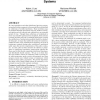Free Online Productivity Tools
i2Speak
i2Symbol
i2OCR
iTex2Img
iWeb2Print
iWeb2Shot
i2Type
iPdf2Split
iPdf2Merge
i2Bopomofo
i2Arabic
i2Style
i2Image
i2PDF
iLatex2Rtf
Sci2ools
106
click to vote
CCS
2006
ACM
2006
ACM
Safety and consistency in policy-based authorization systems
In trust negotiation and other distributed proving systems, networked entities cooperate to form proofs that are justified by collections of certified attributes. These attributes may be obtained through interactions with any number of external entities and are collected and validated over an extended period of time. Though these collections of credentials in some ways resemble partial system snapshots, these systems currently lack the notion of a consistent global state in which the satisfaction of authorization policies should be checked. In this paper, we argue that unlike the notions of consistency studied in other areas of distributed computing, the level of consistency required during policy evaluation is predicated solely upon the security requirements of the policy evaluator. As such, there is little incentive for entities to participate in complicated consistency preservation schemes like those used in distributed computing, distributed databases, and distributed shared memor...
CCS 2006 | Consistency | Consistency Preservation Schemes | Distributed Computing | Security Privacy |
Related Content
| Added | 20 Aug 2010 |
| Updated | 20 Aug 2010 |
| Type | Conference |
| Year | 2006 |
| Where | CCS |
| Authors | Adam J. Lee, Marianne Winslett |
Comments (0)

